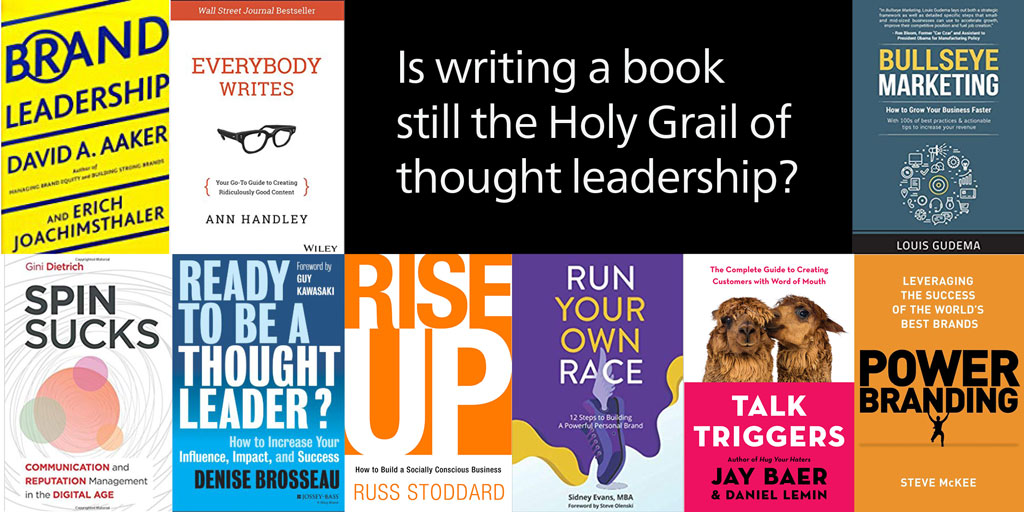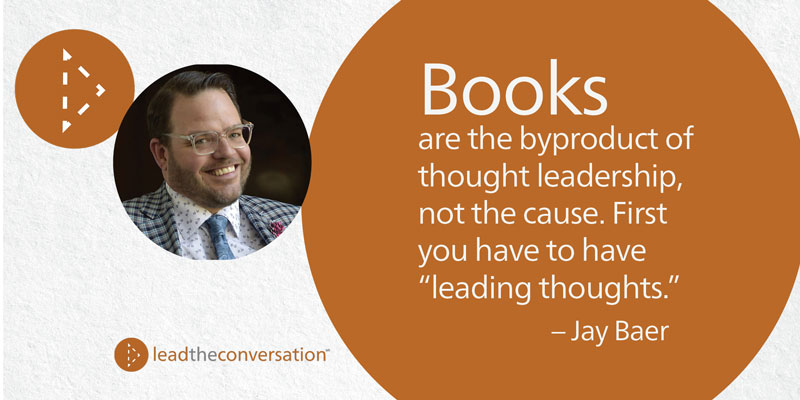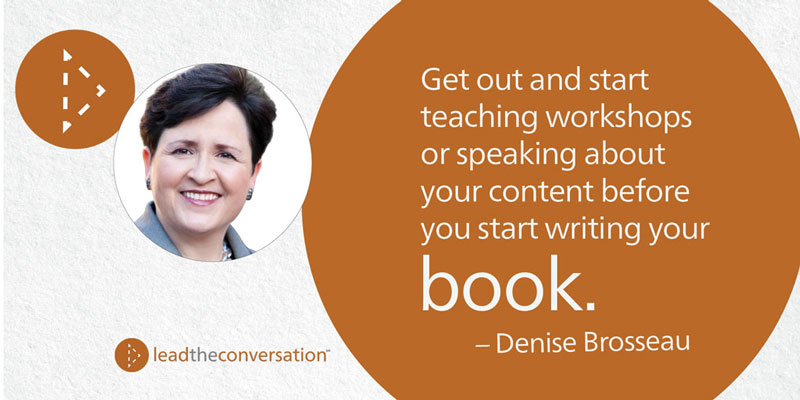
Thought leadership: are books still the Holy Grail?
There I was, sitting with a new CEO client, sketching out the beginnings of a reasonably multi-modal thought leadership program: videos, articles, blog posts, an interview series with industry notables (aka, his prospects), original research, speaking opportunities and so on. As I began to think aloud about prioritizing possible efforts against available resources, he cut me short to proclaim, “Oh, and I think I should write a book!”
This thought-leader-in-the-making is not alone in this thought. Simply search for “my new book” on LinkedIn and you’ll get thousands of results for tomes covering everything from lead generation to midwifery to “facing existential contradictions.” But, given all the options for digitally publishing one’s own content, coupled with the fact that, as of 2016, only 19.5 percent of Americans were reading at all, I began to wonder if writing a book is still worth it, at least as far as becoming known as a business thought leader is concerned.
Available publishing stats and research reports weren’t shedding significant light on the matter, so I turned to some of the brightest bulbs I know, to ask:
- Is writing a book a must if you want to be considered a true thought leader?
- What’s been the biggest benefit of becoming an author?
- What’s your advice to would-be thought leaders thinking of writing their first book?
- Do you plan to write another book—and, if so, can you share the topic?
Here are just a few of their answers.
Is writing a book a must for becoming a true thought leader?
Jay Baer
Author of Talk Triggers: The Complete Guide to Creating Customers with Word of Mouth and several other books, and founder of Convince & Convert
“No. I think books are a byproduct of thought leadership, not the cause. First you have to have ‘leading thoughts.’ Oftentimes, they eventually end up being collated in book form. But one doesn’t beget the other, especially now when book publishing is available to all.”

Ann Handley
Author of multiple books including Everybody Writes: Your Go-To Guide to Creating Ridiculously Good Content, and Chief Content Officer of MarketingProfs
“I don’t think a book is a must. But I think you do need to be publishing something that’s valuable and honestly empathetic to the audience you want to lead. It could be a newsletter, or a magazine, or a podcast… but you have to write, record, or produce something of quality that coherently shares your ideas.
That said, there is something special about a book. It has an immediate gravitas that many other content types lack. So, I don’t think you MUST do it. But if you’re asking if I would…? Yes.”
Gini Dietrich
Author of Spin Sucks: Communication and Reputation Management in the Digital Age, creator of the Spin Sucks blog and community and CEO of Arment Dietrich
Before I wrote a book (and then a second), I would have said no, but having seen it first-hand, the answer is yes. Almost every conference organizer invites authors first as speakers and the level of respect you receive from business leaders—particularly at the Fortune 500—is almost insane. It’s not necessarily how it should work, but it is how it does work. (There might also something to be said in the difference of men versus women thought leaders, but that’s a different topic for a different time.)
Russ Stoddard
Author of Rise Up: How to Build a Socially Conscious Business, and CEO of OliverRussell
“I don’t think writing a book is a must for being a thought leader. While it’s helpful, two forces are countering what once was a must: self-publishing has lowered the bar on quality books (anyone can write a book) and social media has elbowed into the thought-leadership space once occupied by the longer-form narrative. I find that what really defines ‘thought leadership’ are true actions and insights around social impact, chronicled and shared via Medium, LinkedIn, and sometimes Twitter.”

What’s been the biggest benefit of becoming an author?
Erich Joachimsthaler
Author of Hidden in Plain Sight, co-author of Brand Leadership, and CEO of Vivaldi Group
The book has given me access to new people, companies and brands that are as intensively interested in subject as I am. This has opened so many doors for extending my ideas, doing consulting work, giving speeches inside companies and in larger forums, et cetera. The book has opened the doors to endless possibilities.
Denise Brosseau
Author of Ready to Be a Thought Leader? How to Increase Your Impact Influence and Success, and CEO of Thought Leadership Lab
Writing a book has led to so many positive outcomes. A friend passed my book to an instructor at Stanford Business School, my alma mater, and he reached out and invited me to co-teach a class based on the book content. That led to more speaking, coaching and even some PR. It has been a lovely unfolding of new opportunities every year since the book was published and has definitely helped me grow my business and increase my impact far beyond my initial community and network. In 2018, I was invited to create an online course, Becoming a Thought Leader, with LinkedIn Learning and Lynda.com, based on my first book.
Louis Gudema
Author of Bullseye Marketing: How to Grow Your Business Faster, and President of revenue & associates
The impact of my Bullseye Marketing book has been incremental, not transformative. It has gained me considerable visibility, creating the opportunity to be interviewed on dozens of podcasts and speak at many events. It is also a “350-page resume” that has helped me gain new clients and business. But there are SO many factors that may go into what the impact of a particular person’s book may be, it would be hard to predict.
Gini Dietrich
Hands down, it’s been the ability to command a higher speaking fee.
What’s your advice to would-be thought leaders thinking of writing their first book?
Steve McKee
Author of Power Branding: Leveraging the Success of the World’s Best Brands and Co-Founder, McKee Wallwork + Co.
Come up with a killer title first. Make sure it’s unique and represents a take on the world nobody has yet had. Find a publisher. Not only for the credibility and quality control that a publisher provides, but for the paces they’ll put you through and the deadline they’ll give you. The easiest thing in the world to do is procrastinate, so a real deadline is very helpful. A publisher will ensure you develop a higher-quality product.
Jay Baer
Write a speech first. Figure out how to explain your ideas powerfully in 45 minutes in front of an audience. If you can do that, you have the spine of a book.
Erich Joachimsthaler
My advice is to not start the journey of becoming a thought leader with writing a book—it simply takes too long. Instead, I would plan out a 1,000-day journey (about three years) where you invest in an area of intensive interest and passion. The book will evolve during the journey, and it will become a marker or reference point for you, the thought leader, and also for the people who follow you.
Denise Brosseau
Get out and start teaching workshops or speaking about your content before you begin writing your book. This will allow you to see what content resonates and will help you refine your ideas into more bite-size pieces that people can learn from.

Louis Gudema
New authors need to understand that whether they are self-publishing (as I did) or are being published by an existing publisher, they will be responsible for 98% of the marketing. So, they need to put together an in-depth marketing plan and execute on it. The one thing that I wish I had done differently is have the book ready four or five months before I released it. That would have made it possible to have more interviews, appearances, reviews, etc., all teed up to drop around the time of the book’s release instead of coming out over the following six months. That would have been helpful.
Do you plan to write another book — and on what topic?
Jay Baer
Probably. Just BARELY starting the concepting. I’m toying with an angle that we need to reprioritize big ideas in this era of tweaks, iterations, and optimization.
Erich Joachimsthaler
Yes. In two weeks, I will send in my new manuscript, which should be published by the end of the year. The topic? How to build brands and businesses in the age of exponentiality.
Gini Dietrich:
BITE YOUR TONGUE! I probably have at least one more in me. Spin Sucks needs to be updated pretty badly, and I’ve always wanted to write a novel. So, I imagine that’ll be next…at some point in my life.
Beyond thought leadership stage cred
Now you have some idea of what writing a book might do for you—but what gets first-time authors to take the plunge? There’s no guarantee of any of the above pay-offs.
I decided to reach out to a first-time book author, my Brandingmag mate Sidney Evans, to ask him why he wrote his just-published book, Run Your Own Race: 12 Steps to Building a Powerful Personal Brand. I’m sure he’d like to access all the career-building book benefits referenced here—but I was heartened by his less profit-oriented first response. “The main motivation for writing the book was to help individuals gain clarity and actualize their fullest potential. I would be truly humbled if the book is utilized as a tool for growth and understanding.”
Now, the words “humble” and “thought leader” aren’t often strung closely together, but I trust Sidney’s sincerity. And I like the notion that any kind of genuine leadership, thought or otherwise, might best arise from a sense of humility, humanity and (as Jay Baer once said in my favorite book title) Youtility. So, a book isn’t a must for thought leadership after all — but if you still feel you must write one, here’s hoping you take the above advice to heart.
Suggested additional reading:
How I wrote and marketed a best-selling New York Times business book
How to make your CEO a thought Leader
________________________________________________
About the Author Chuck Kent, the Chief Conversation Officer at Lead the Conversation, works with executives to help them more easily create authentic, compelling thought leadership content – and to lead industry conversations. He is a writer, brand strategist, content creator and expert interviewer. Chuck is also a Contributing Editor for Branding Magazine, for which he created the monthly Branding Roundtable.
We help top executives create:
Interview series
Videos
Bylined articles
Blog posts
All forms of content
